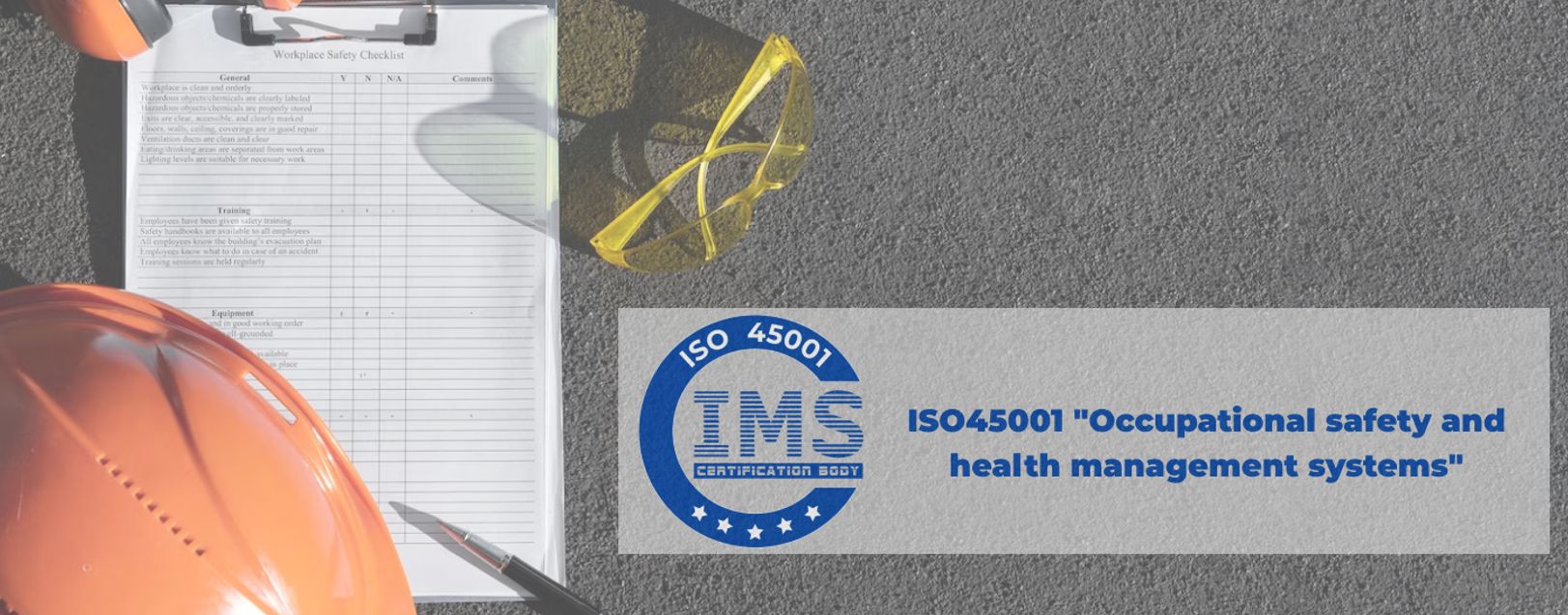Management system certification is today’s requirement. Availability of certificates of compliance with international standards is a condition of contractual, tender and, in some cases, legislative requirements. Management system certification will improve your company’s image, create competitive advantages, and help you to enter European and international markets.

The certification body “IMS INTERNATIONAL” provides certification services according to various international standards, namely:
-
- ISO 9001:2015 Quality management systems – Requirements;
- ISO 14001:2015 Environmental management systems – Requirements with guidance for use;
- ISO 45001:2018 Occupational health and safety management systems — Requirements with guidance for use;
- ISO 22000:2018 Food safety management systems – Requirements for any organization in the food chain
- ISO 50001:2018 Energy management systems – Requirements with guidance for use;
- ISO/IEC 27001:2022 Information technology – Security techniques – Information security management systems – Requirements;
- ISO 13485:2016 Medical devices — Quality management systems — Requirements for regulatory purposes
ISO 9001 Quality Management Systems

The organization’s quality management system in accordance with ISO 9001 ensures the achievement of the company’s goals and objectives by formalizing processes, procedures and responsibilities. The standard is based on seven quality management principles aimed at ensuring that the requirements of customers and all interested parties are met:
- customer focus;
- leadership;
- engagement of people;
- process approach;
- improvement;
- evidence-based decision making;
- relationship management.
What are the benefits of ISO 9001 certification?
The procedure for quality management systems certification according to ISO 9001 helps organizations to:
- establish control over all production processes;
- develop and improve production efficiency;
- ensure compliance with legal and regulatory requirements;
- enter new markets;
- determine risks and describe the process of managing them.
ISO 14001 Environmental Management Systems
ISO 14001 was created to help the companies to develop a management system aimed at reducing their impact on the environment. Guided by this standard, companies receive tangible economic benefits, constantly improve their environmental performance, implement a systematic approach for setting environmental targets, and ensure compliance with environment policy legislation.
What are the benefits of ISO 14001 certification?
Advantages of implementation of the standard:
- increased confidence of state authorities;
- increased confidence of partners and investors;
- reduced costs due to the reduced waste;
- reduced costs due to reduced consumption of electricity and other resources;
- increased confidence of consumers, for whom the environmental factor is becoming increasingly important.
ISO 45001 Occupational health and safety management systems
ISO 45001 is designed to prevent occupational accidents and diseases, and to provide safe workplaces. The basis of the standard is the assessment of risks and the development of actions to reduce their impact. The standard covers a number of requirements for operational activities, as well as the analysis and prevention of possible emergencies. Particular attention is paid to the health of workers, including physical and psychological factors, non-discrimination and the ability to assert their rights.
What are the benefits of ISO 45001 certification?
- reduction of financial losses;
- demonstration of the level of reliability of the company for employees, investors and partners;
- improvement of the image in the eyes of consumers, regulators and other interested parties;
- minimization of risks of accidents and emergencies;
- reduction of compensation costs, as well as fines and orders from regulatory authorities.
ISO/IEC 27001 Information security, cybersecurity and privacy protection. Information security management systems

This standard establishes requirements for organizations to protect their information resources by creating a reliable information infrastructure. A company that received ISO/IEC 27001 certificate proves that it successfully manages and constantly improves the security processes for intellectual and financial information, as well as information received from third parties.
What are the benefits of ISO/IEC 27001 certification?
- Minimization of risks of illegal access to commercial information in order to cause damage to the company;
- Demonstration of high reliability of the organization to partners;
- Transparency of the information management process;
- Attraction of new partners and investors to the business, including foreign ones;
- Increasing the profit of the organization.
ISO 22000 Food safety management systems – Requirements for any organization in the food chain

Food companies take responsibility for producing safe products for their consumers. ISO 22000 contains a number of rules and proposals for reducing potential hazards to an adequate level, preventing their occurrence up to their complete elimination. This standard is based on the HACCP principles, the implementation of which is mandatory at the legislative level of Ukraine and ensure a greater consistency of the procedures performed in the companies to ensure food safety.
What are the benefits of ISO 22000 certification?
- compliance with regulatory and legal requirements;
- ensuring the stable operation of the company’s system at all stages of production;
- hazards prevention rather than reacting to hazards after their occurrence;
- recognition by all companies in the global food supply chain;
- the possibility of developing an effective food safety management system based on already existing sanitary and hygienic programs and production control plans;
- reduction of the number of errors in the work of employees due to an increase in the level of their training;
- reduction of costs for the management activities of the company;
- obtaining tender competitive advantages;
- improvement of consumer confidence in products.
ISO 50001 Energy Management Systems

The international standard, developed by the International Organization for Standardization for Standardization for energy management systems, specifies the requirements for development, implementation, maintenance and improvement an energy management system, the purpose of which is to enable an organization to follow a systematic approach in achieving continual improvement of the energy system, including energy efficiency, energy security and energy consumption.
ISO 50001 standard provides any organization, regardless of its size, territorial or geographic location, with a complete strategy for actions in the managerial and technical areas in order to improve the efficiency of the organization’s energy system.
What are the benefits of ISO 50001?
- Transparency and objectivity of the assessment of energy efficiency.
- Reduction of costs.
- Opportunity to participate in tenders.
- Enhancement of image and reputation of the organization.
- Improvement of the competitiveness of the organization. Obtaining a marketing tool to attract more consumers and partners.
- Reduction of environmental pollution and conservation of natural resources.
EN ISO 13485 Medical devices. Quality management systems. Requirements for regulatory purposes
The international standard for quality management system for medical devices that specifies the requirements for a quality management system where an organization needs to demonstrate its ability to provide services for the design and development, production, installation, maintenance and sale of medical devices and related services that meet customer requirements and applicable regulatory requirements.
What are the benefits of EN ISO 13485 certification?
- Unhindered trade opportunities and recognition in the most countries of the world.
- Increasing the commercial value of the product in terms of greater consumer confidence.
- Improvement of the image and brand of companies that demonstrate commitment to international standards, best practices and product quality, as well as compliance with applicable legal and regulatory requirements.
- Obtaining the opportunity to develop the company’s business processes in accordance with the high requirements of international and European standards.
- Increase in sales, improving positions in existing markets and opportunity to enter new distribution markets.
- Gaining a competitive advantage when competing for lucrative contracts and orders, all other things being equal.
- ISO 13485 standard harmonizes with other international standards and specifications for management systems, such as ISO 9001, GMP and others, which makes it possible to build an effective management system.
Our specialists will be happy to answer all your questions, conduct a diagnostic audit, if necessary, help you to fill in an application and conduct a certification audit.





